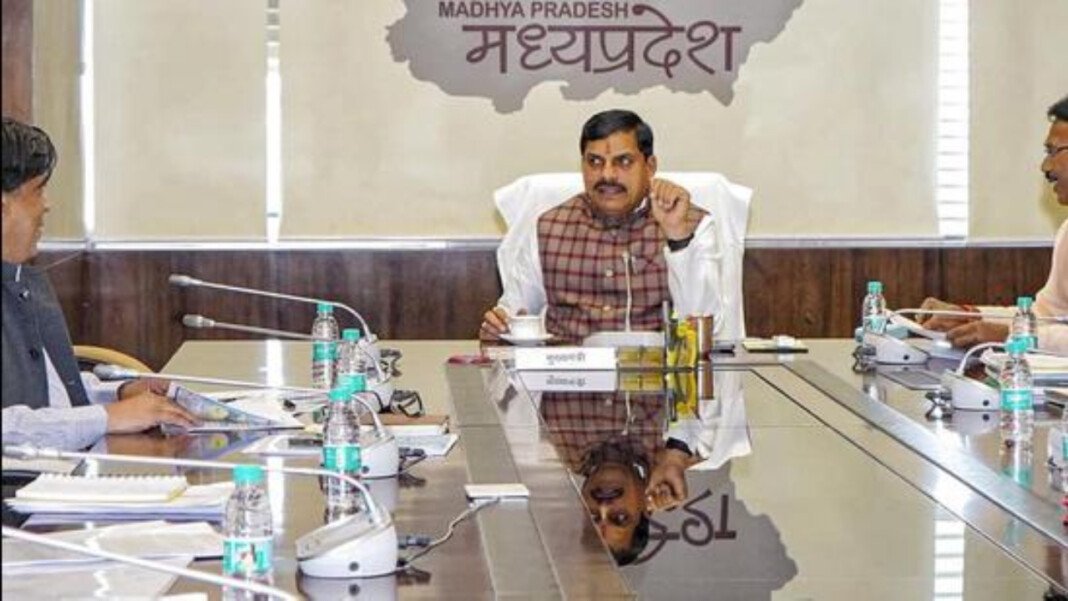Bhopal, Feb 19: Ahead of the state’s biennial investor summit, the Madhya Pradesh Cabinet has approved seven new policies to attract investments in sectors ranging from real estate to startups, clean energy and hotels.
The Cabinet headed by Chief Minister Mohan Yadav approved an integrated township policy, a policy for the development of small businesses, a plan for startups, a civil aviation policy, developing a lake view hotel in public-private partnership and policies for electric vehicles and biofuels.
Madhya Pradesh will host the Global Investors Summit (GIS) 2025 on February 24-25, 2025, showcasing the state’s investment potential and attracting global investors.
The ‘Integrated Township Policy 2025’ aims to encourage private investment in real estate projects in urban areas, which will not just create jobs but also boost economic activity and the state’s GDP, according to a state government press release.
The policy aims to develop land through land pooling to develop big townships. The state government will be responsible for land acquisition as well as development of external infrastructure such as roads, water and sewerage lines and power transformers.
The integrated township will be implemented in areas where infrastructure facilities are available. The policy mandates a minimum land requirement of 10 hectares for cities with a population of less than 5 lakh, and 20 to 40 hectares for cities with more than 5 lakh people.
Developers will be required to register with the competent authority. A committee, chaired by the Principal Secretary at the state level and the Collector at the district level, will approve township proposals.
The Directorate of Urban and Rural Investment will be the nodal agency for implementing the township policy.
The policy promises timely approvals, stamp duty concessions, colony rule exemptions, easier development plan amendments, green FAR (Floor Area Ratio), FAR for non-traditional energy use, and additional FAR for affordable housing units. A competent committee at the department level will be authorized to approve the conversion of the proposed land use.
The policy will promote organised urbanisation in the state, the statement said adding that presently colonies are developed on small plots of land which hinder systematic infrastructure planning.
The existing rules do not have a minimum area restriction for colony development, leading to rapid fluctuations in the demand and supply of urban land for development. To address this delay in basic infrastructure and affordable housing development, the ‘Integrated Township Policy’ is being implemented, it said.
The state cabinet also approved the new Madhya Pradesh MSME Development Policy 2025 to promote micro, small, and medium enterprises (MSMEs). The policy will provide benefits of the Madhya Pradesh Logistics Policy 2025 and Export Policy 2025 to MSMEs.
Under the Industry Promotion Policy 2025, the MSME Department will be authorised to offer customised packages to classified mega units in the MSME category.
Incentives include up to 40 per cent capital support, concessions for export units, and freight subsidy among others.
The new policy includes financial incentives like 1.5 times subsidy for medium enterprises providing over 100 jobs, Rs 5,000 per employee per month for five years in employment creation sectors, and Rs 13,000 for skill development training.
Support will also be given for new areas such as MSME exchanges, lean engineering, testing labs, and technology transfer. For the first time, sectors like logistics, recycling, motor vehicle scrapping, and R&D in the service sector will also be included.
The Cabinet has also approved amendments to the Madhya Pradesh Industrial Land Allotment and Management Rules 2021 for the allocation of developed industrial plots and industrial areas/complexes to MSMEs through e-bidding, and undeveloped land via an online process.
The allocation process will be expedited and made more transparent, the statement said.
The Madhya Pradesh Start-Up Policy and Implementation Plan 2025 will provide both financial and non-financial support for start-ups and incubators.
A mega incubation centre will be developed and operated in certain locations, with satellite centres in other regions, in collaboration with leading national and international institutions under public-private partnerships.
The Chief Minister’s Entrepreneur Revolution Scheme will provide collateral-free loans to start-ups through banks, along with coverage under the central government’s Start-Up Loan Guarantee Scheme and a 5 per cent annual interest subsidy for up to five years.
While the Civil Aviation Policy will develop new air routes and connect key tourism and religious destinations in the state with the rest of the country and the world to promote tourism, religious, and business travel, the Electric Vehicle Policy 2025 will provide incentives for electric two-wheelers, three-wheelers, cars, buses, and charging stations.
The formation of the Madhya Pradesh EV Promotion Board has also been approved.
The Biofuel Policy 2025 under the Madhya Pradesh Renewable Energy Policy 2025 will provide various incentives for biofuel manufacturing units, bioenergy plants, and agricultural institutions, with priority land allocation for the successful establishment of biofuel production units.
The Cabinet also approved a 60-year lease for the development, operation, and maintenance of Lake View Residency Hotel, Bhopal, under a public-private partnership. The lease period can be extended by mutual consent for an additional 10 years.
Presently, a joint venture of India Tourism Development Corporation and Madhya Pradesh State Tourism Development Corporation operates the 3-star Hotel Lakeview Ashok overlooking the splendid upper lake of the city. (PTI)












